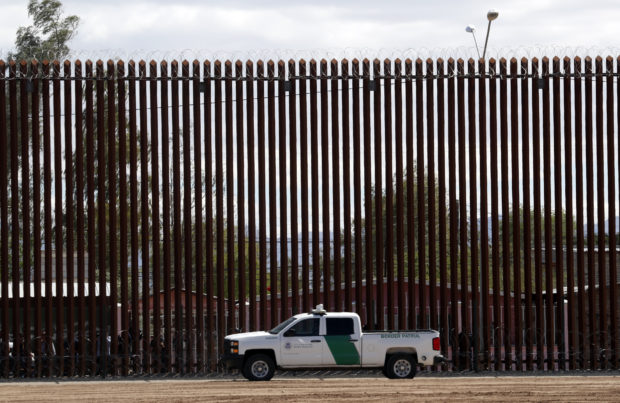Judge rejects Congress’ challenge of border wall funding
WASHINGTON – A federal judge on Monday denied a House request to prevent President Donald Trump from tapping Defense Department money for his proposed border wall with Mexico, saying Congress lacked authority to sue.
Trump’s victory is muted by a federal ruling in California last month that blocked construction of key sections of the wall.
The California case was filed by the American Civil Liberties Union on behalf of the Sierra Club and Southern Border Communities Coalition.

FILE – In this April 5, 2019, file photo, a U.S. Customs and Border Protection vehicle sits near the wall as President Donald Trump visits a new section of the border wall with Mexico in El Centro, Calif. A federal judge has denied a request by the U.S. House of Representatives to prevent President Donald Trump from tapping Defense Department money for a border wall with Mexico. (AP Photo/Jacquelyn Martin, File)
U.S. District Judge Trevor McFadden, a Trump appointee, wrote that the House’s lawsuit was “about whether one chamber of Congress has the ‘constitutional means’ to conscript the Judiciary in a political turf war with the President over the implementation of legislation.”
McFadden said Congress didn’t have authority in this case but that he didn’t mean to imply the legislative body could never challenge the president in court over separation of powers.
“An old maxim in politics holds that, ‘Where you stand depends on where you sit,'” he wrote. “At law too, whether a plaintiff has standing often depends on where he sits. A seat in Congress comes with many prerogatives, but legal standing to superintend the execution of laws is not among them.”
Article continues after this advertisementThe Justice Department welcomed the decision, saying the judge “rightly ruled that the House of Representatives cannot ask the judiciary to take its side in political disputes and cannot use federal courts to accomplish through litigation what it cannot achieve using the tools the Constitution gives to Congress.”
Article continues after this advertisementLawyers for the House didn’t immediately respond to messages seeking comment, including whether they will appeal.
A federal judge in Oakland, California, ruled May 24 that Trump overstepped his authority and blocked work from beginning on two of the highest-priority, Pentagon-funded wall projects — one spanning 46 miles (74 kilometers) in New Mexico and another covering 5 miles (8 kilometers) in Yuma, Arizona.
The administration plans to appeal the ruling by Haywood Gilliam Jr., an appointee of President Barack Obama.
At stake is billions of dollars that would allow Trump to make progress on a signature campaign promise heading into his bid for a second term.
The administration faces several lawsuits over the emergency declaration but only two sought to block construction during the legal challenge.
Trump declared a national emergency in February after losing a fight with the Democratic-led House that led to a 35-day government shutdown and identified up to $8.1 billion for wall construction.
The funds include $3.6 billion from military construction funds, $2.5 billion from Defense Department counterdrug activities and $600 million from the Treasury Department’s asset forfeiture fund. /gg